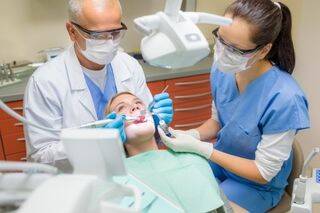Common Dental Complications for Oral Cancer Patients
What Cancer Patients Should Look Out for Regarding their Oral Health
Information provided by the American Cancer Society shows thousands of new cases of oral and oropharyngeal (throat and neck) cancer are diagnosed every year. These forms of cancer often occur in the floor of the mouth, tongue, minor saliva glans, and lips, and the most common treatment for these patients is often surgery, chemotherapy, radiation therapy, and some new, more targeted therapies.
While these treatments are often effective, they can cause additional complications for patients down the road. For those who are receiving or have received radiation therapy of the neck or head area, there is an increased risk of developing oral complications due to this therapy. These complications can include very sensitive lesions in the oral cavity, dry mouth, hypersensitivity in the teeth, difficulty swallowing, and even rapid tooth decay. Chemotherapy can often have these same negative oral effects on patients.
How to Ease Complications
Even though these complications may be unavoidable, it is important for patients to know their oncologist and dentist can work together to help manage or minimize these complications and even help prevent them if they have not yet occurred both during and after oral cancer treatments have started. There are also some things patients themselves can do to help prevent or minimize the effects of cancer therapies on their oral health and wellness.
For patients currently in treatment for a cancer diagnosis, they can gently brush their teeth and gums twice a day to help maintain their oral health unless otherwise directed by their dentist. For patients experiencing unusual treatment conditions, their dentist may recommend using a mouthwash or mouth rinse in addition to their daily brushing and cleaning routine. Should patients develop dry mouth, their dentist may also recommend patients to use a saliva replacement or an over-the-counter artificial saliva. Fluoride applications may also be a recommendation.
While maintaining a proper oral hygiene routine can often help mitigate any additional oral health complications, there are some conditions patients should continue to look for. Mouth infections often have serious complications, both for patients who are or who have undergone cancer treatments. Should patients experience anything unusual including pain or swelling in their throat, teeth, or mouth that does not go away within a few days, they should contact their dentist or physician immediately.
If you or a loved one has dental complications that need addressing or need just a trip to the dentist, feel free to sign up for our New Hampshire Family Discount Dental Plan and save as much as 20 percent on your dental bills. For more information, please click here.
Copyright: limonzest / 123RF Stock Photo











